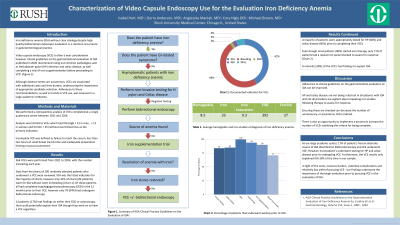Tuesday Poster Session
Category: General Endoscopy
P4101 - Characterization of Video Capsule Endoscopy Use for the Evaluation of Iron Deficiency Anemia
Tuesday, October 29, 2024
10:30 AM - 4:00 PM ET
Location: Exhibit Hall E

Has Audio

Isabel Hart, MD
Rush University Medical Center
Chicago, IL
Presenting Author(s)
Isabel Hart, MD, Sierra Anderson, MD, Agnieszka Maniak, MD, Cory Higley, DO, Michael Brown, MD, MACM
Rush University Medical Center, Chicago, IL
Introduction: Iron deficiency anemia (IDA) without clear etiology despite high-quality bidirectional endoscopic evaluation is a common occurrence in gastroenterological practice. Video capsule endoscopy (VCE) is often a next consideration however clinical guidelines on the gastrointestinal evaluation of IDA published in 2020 recommend ruling out common pathologies such as Helicobacter pylori (HP) infection and celiac disease, as well completing a trial of iron supplementation before proceeding to VCE. Although adverse events are uncommon, VCEs are associated with additional costs and time burden, underscoring the importance of appropriate candidate selection. Adherence to these recommendations, as well as trends in VCE use, was assessed in a large academic.
Methods: We performed a retrospective analysis of VCEs completed at a single quaternary center between 2021 and 2024. Analysis was limited to VCEs which had IDA without overt blood loss as the primary indication. Incomplete VCE was defined as failure to reach the cecum, less than two hours of small bowel transit time and inadequate preparation limiting mucosal assessment.
Results: 364 VCEs were performed from 2021 to 2024, with the number increasing each year. Data from the charts of 200 randomly selected patients who underwent a VCE were reviewed. IDA was the second most common indication for VCE (41.5%; 83 patients). Of these patients, all had completed bidirectional endoscopy in the 12 months prior to their VCE. A small subset (14%) were incomplete VCEs. Fourteen patients (17%) had findings on either their esophagogastroduodenoscopy (EGD) or colonoscopy that could potentially explain their IDA though they went on to have a VCE anyways. A majority of patients were appropriately tested for HP (84%) and celiac disease (86%) prior to completing their VCEs. Even though most patients (92%) were advised to start iron therapy, only 80% of patients had a repeat iron panel checked to assess for response. A minority (30%) of the VCE’s had findings to explain IDA.
Discussion: Adherence to clinical guidelines on the gastrointestinal evaluation of IDA can be improved. HP and celiac disease are not being ruled out in all patients with IDA and not all providers are vigilant about repeating iron studies following therapy to assess for response. Ensuring these are checked can decrease the number of unnecessary, or premature, VCEs ordered. There is also an opportunity to implement a process to increase the number of VCEs satisfying the criteria for being complete.
Disclosures:
Isabel Hart, MD, Sierra Anderson, MD, Agnieszka Maniak, MD, Cory Higley, DO, Michael Brown, MD, MACM. P4101 - Characterization of Video Capsule Endoscopy Use for the Evaluation of Iron Deficiency Anemia, ACG 2024 Annual Scientific Meeting Abstracts. Philadelphia, PA: American College of Gastroenterology.
Rush University Medical Center, Chicago, IL
Introduction: Iron deficiency anemia (IDA) without clear etiology despite high-quality bidirectional endoscopic evaluation is a common occurrence in gastroenterological practice. Video capsule endoscopy (VCE) is often a next consideration however clinical guidelines on the gastrointestinal evaluation of IDA published in 2020 recommend ruling out common pathologies such as Helicobacter pylori (HP) infection and celiac disease, as well completing a trial of iron supplementation before proceeding to VCE. Although adverse events are uncommon, VCEs are associated with additional costs and time burden, underscoring the importance of appropriate candidate selection. Adherence to these recommendations, as well as trends in VCE use, was assessed in a large academic.
Methods: We performed a retrospective analysis of VCEs completed at a single quaternary center between 2021 and 2024. Analysis was limited to VCEs which had IDA without overt blood loss as the primary indication. Incomplete VCE was defined as failure to reach the cecum, less than two hours of small bowel transit time and inadequate preparation limiting mucosal assessment.
Results: 364 VCEs were performed from 2021 to 2024, with the number increasing each year. Data from the charts of 200 randomly selected patients who underwent a VCE were reviewed. IDA was the second most common indication for VCE (41.5%; 83 patients). Of these patients, all had completed bidirectional endoscopy in the 12 months prior to their VCE. A small subset (14%) were incomplete VCEs. Fourteen patients (17%) had findings on either their esophagogastroduodenoscopy (EGD) or colonoscopy that could potentially explain their IDA though they went on to have a VCE anyways. A majority of patients were appropriately tested for HP (84%) and celiac disease (86%) prior to completing their VCEs. Even though most patients (92%) were advised to start iron therapy, only 80% of patients had a repeat iron panel checked to assess for response. A minority (30%) of the VCE’s had findings to explain IDA.
Discussion: Adherence to clinical guidelines on the gastrointestinal evaluation of IDA can be improved. HP and celiac disease are not being ruled out in all patients with IDA and not all providers are vigilant about repeating iron studies following therapy to assess for response. Ensuring these are checked can decrease the number of unnecessary, or premature, VCEs ordered. There is also an opportunity to implement a process to increase the number of VCEs satisfying the criteria for being complete.
Disclosures:
Isabel Hart indicated no relevant financial relationships.
Sierra Anderson indicated no relevant financial relationships.
Agnieszka Maniak indicated no relevant financial relationships.
Cory Higley indicated no relevant financial relationships.
Michael Brown indicated no relevant financial relationships.
Isabel Hart, MD, Sierra Anderson, MD, Agnieszka Maniak, MD, Cory Higley, DO, Michael Brown, MD, MACM. P4101 - Characterization of Video Capsule Endoscopy Use for the Evaluation of Iron Deficiency Anemia, ACG 2024 Annual Scientific Meeting Abstracts. Philadelphia, PA: American College of Gastroenterology.
